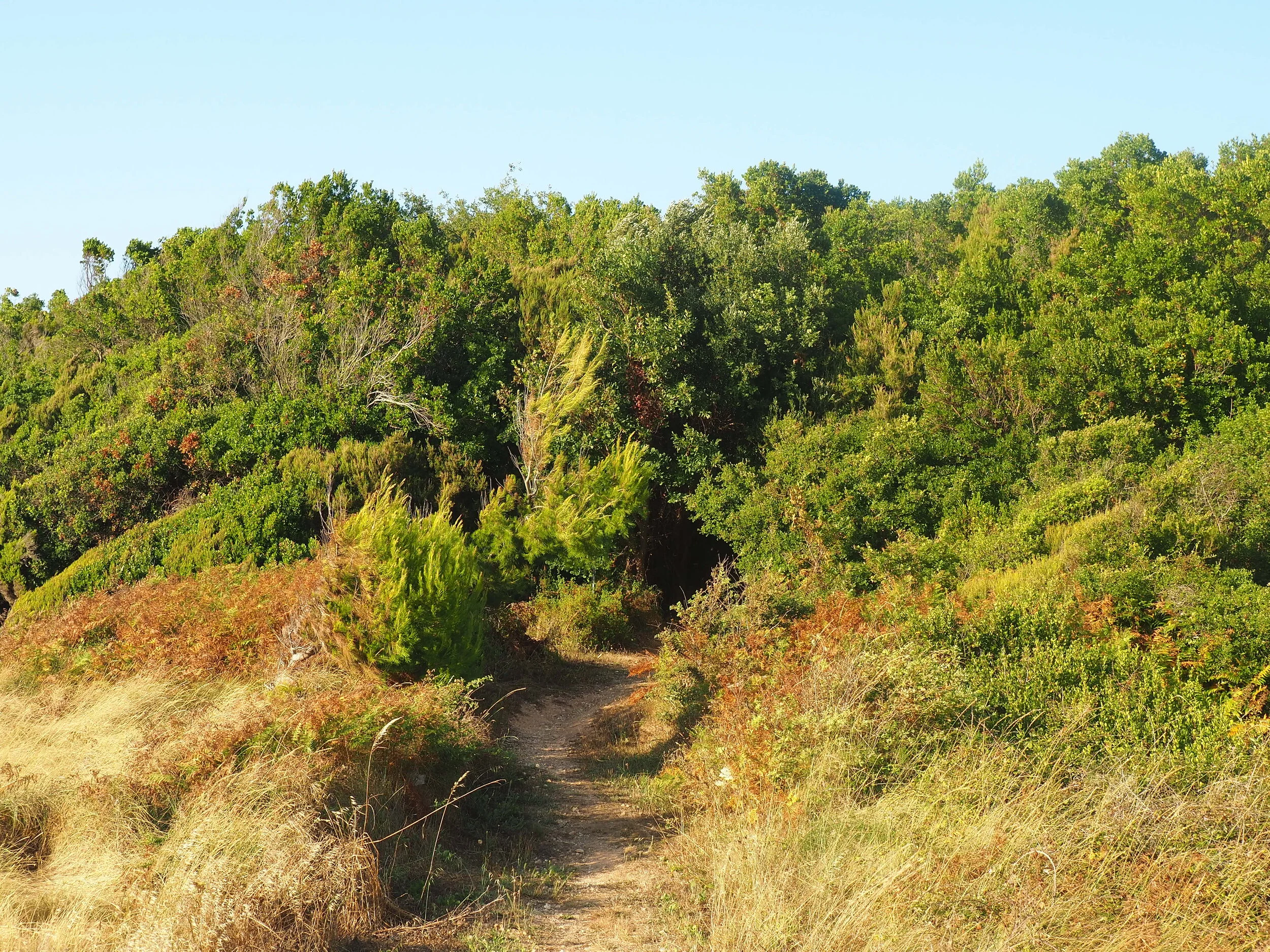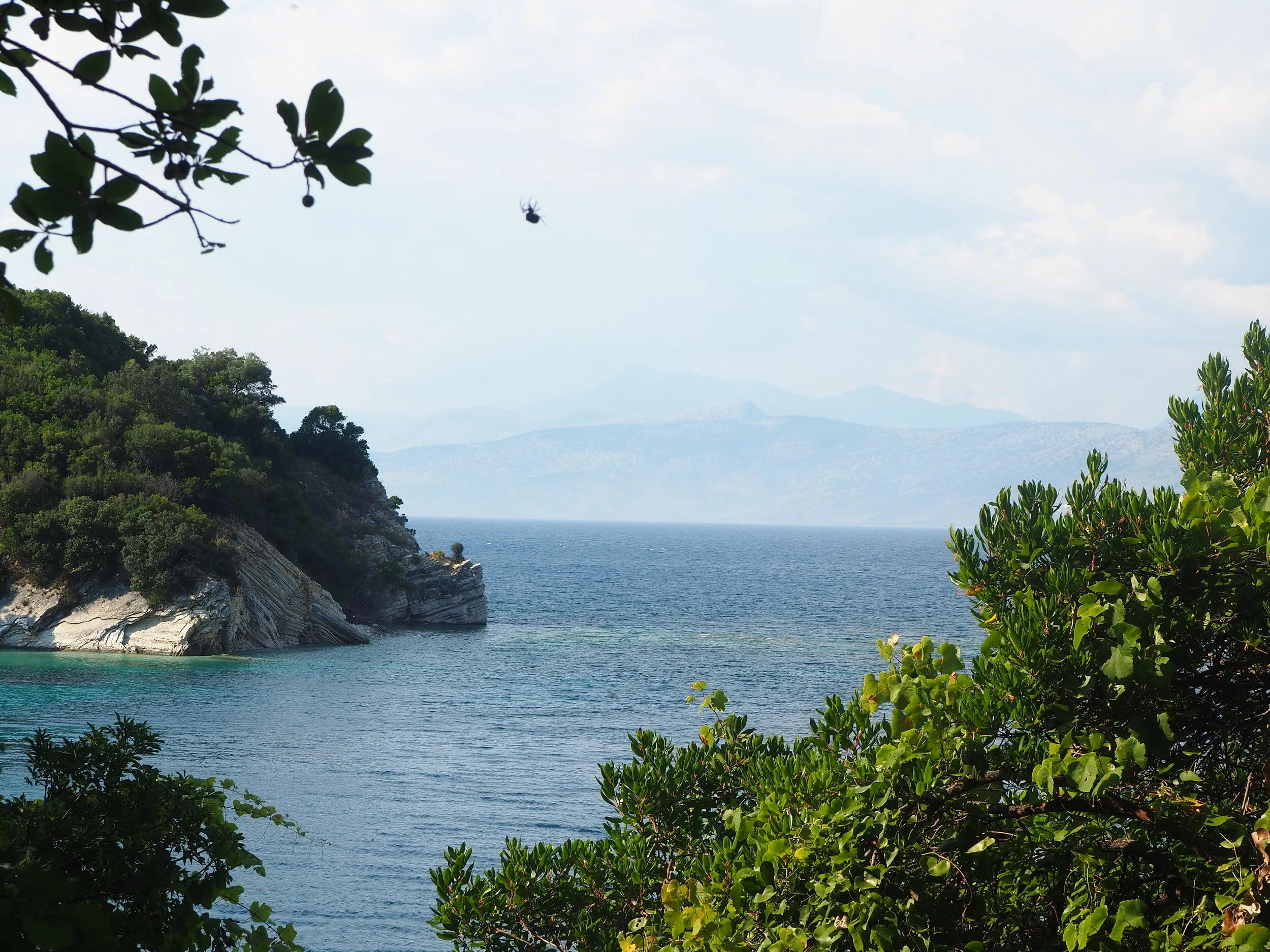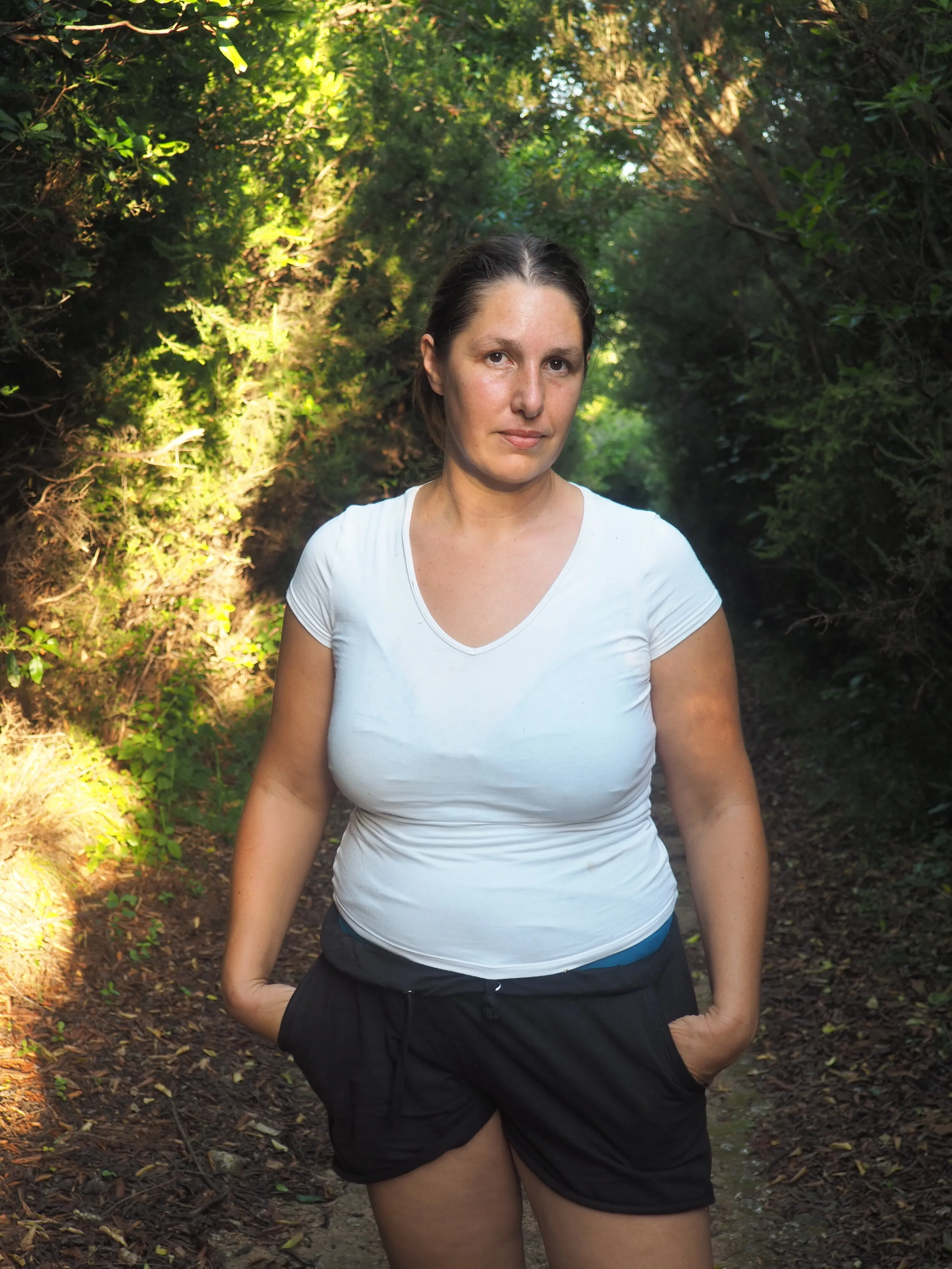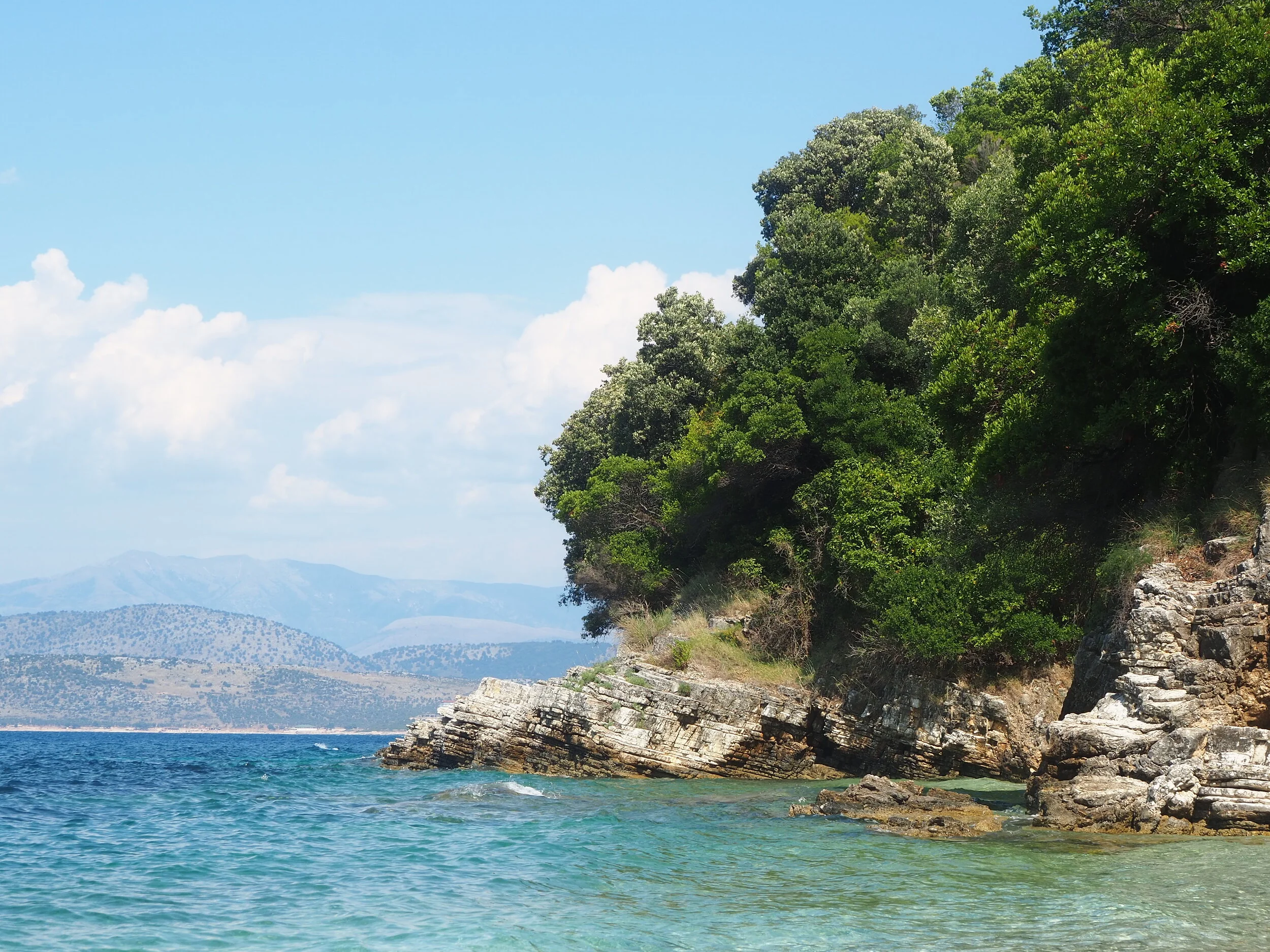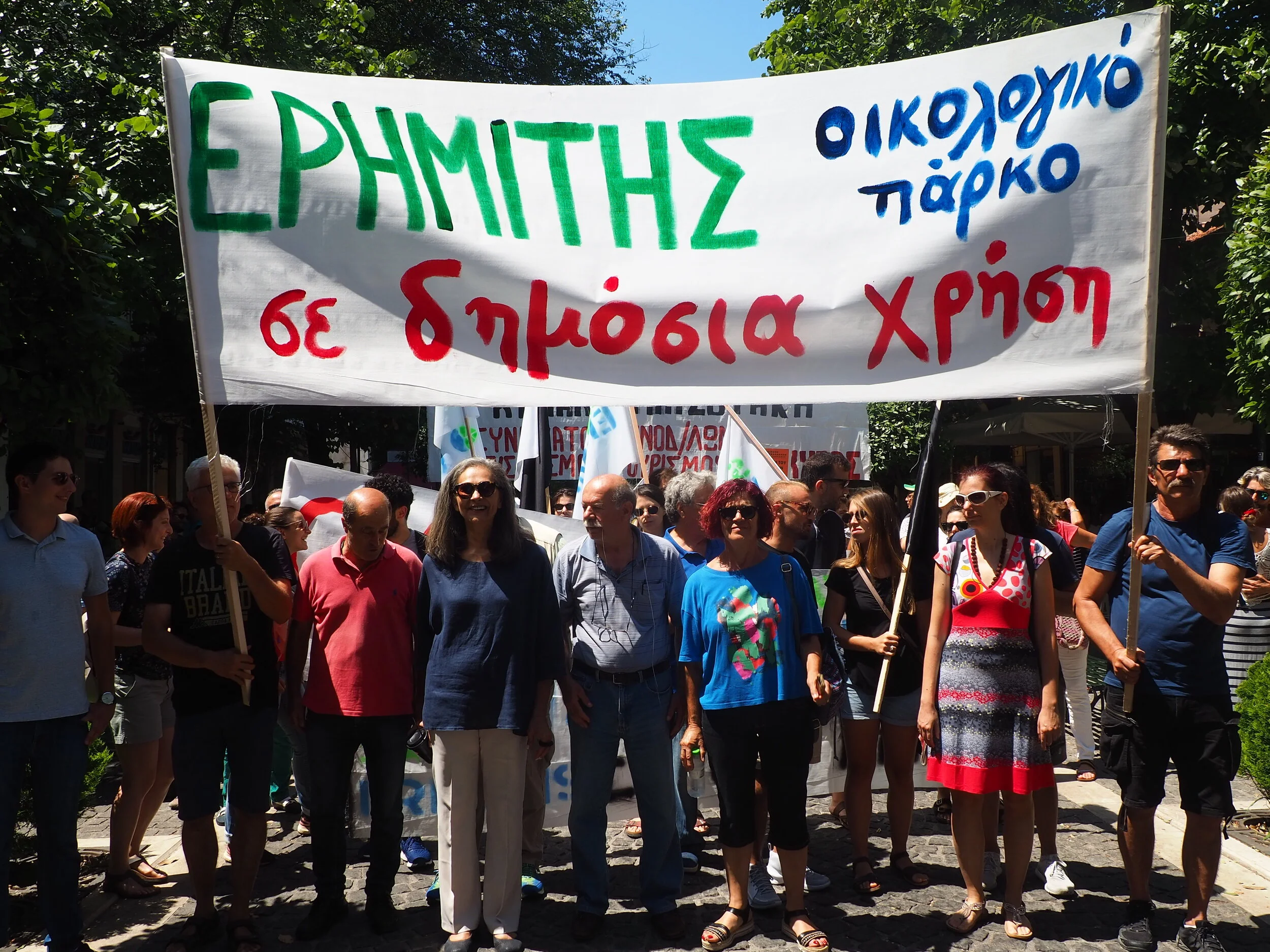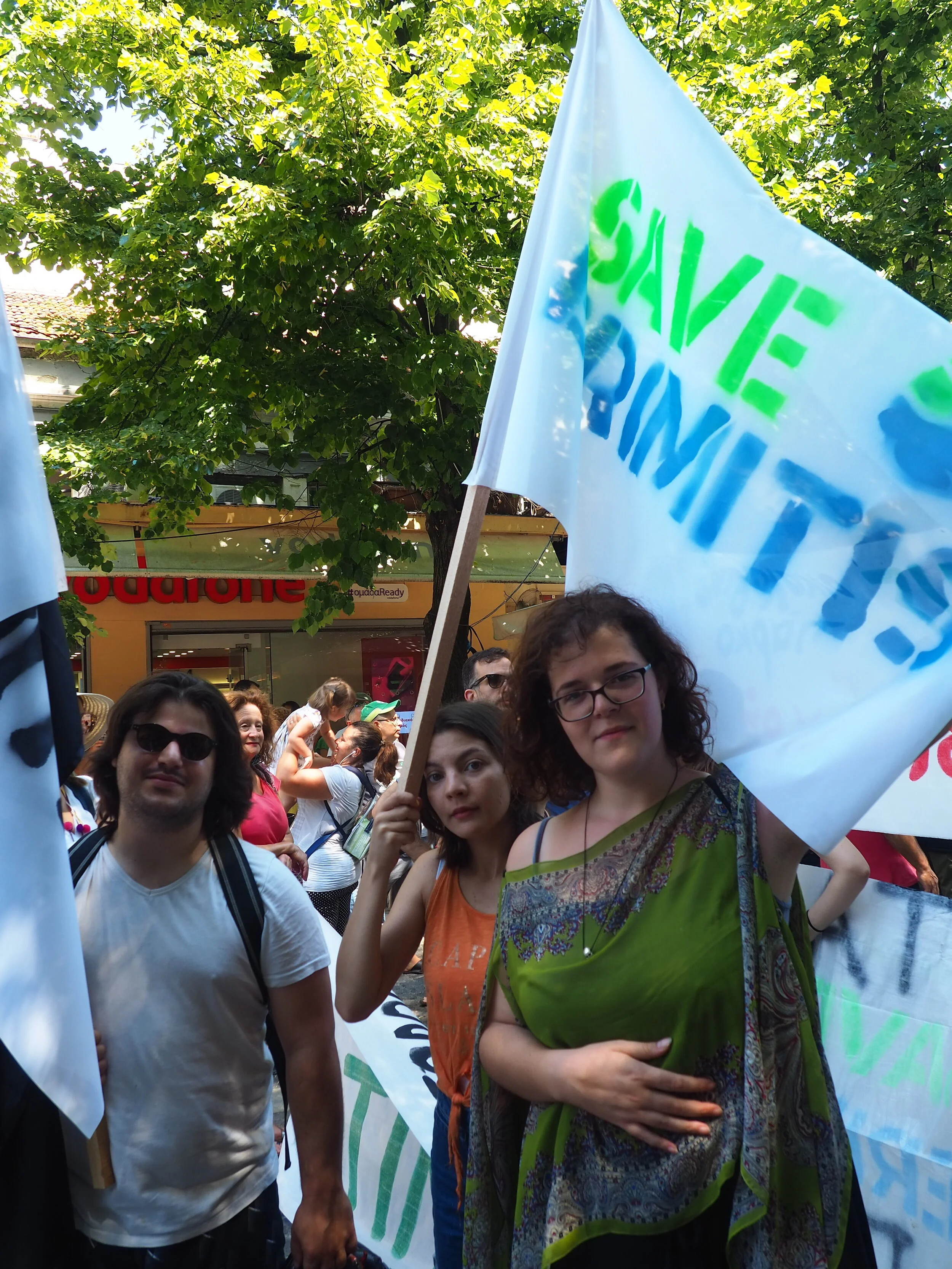The locals fighting to
save a Greek island
On Corfu, residents are starting to wonder
if tourism could be done differently
By Anastasia Miari
Emiritis is Corfu’s last true wilderness.
Photo / Anastasia Miari
Hiking to a breathtaking beach in the north east of Corfu, Xenia Tombrou, a local resident, ducks beneath seemingly endless swathes of spider’s webs. A thin grass snake shimmers in the afternoon light. Bulbous arachnids lurk above. This is her favourite spot on the island. She points out plant varieties, species of birds, secret footpaths, even a rogue stick insect on the path, as we pass in the afternoon heat, ploughing on to Erimitis (meaning ‘hermit’) – one of the last remaining biodiverse spots on the island.
Neighbouring Albania can be seen from Emiritis.
Photo / Anastasia Miari
Xenia is communications officer for Save Erimitis – a committee of residents intent on preserving this wild, virgin land that even the conquering Venetians didn’t touch. Prolific in their olive cultivation on the island, they chose not to plant olive trees in the region, having realised its value as a strategic observation point, just 2km of sea channel away from neighbouring Albania.
“Because of the humidity and the water and the power of this land, the bushes have grown into trees,” says Xenia, pointing out a looming tree that drips strawberries in spring. The entire place is wild. Left to its own devices, Erimitis has been allowed to thrive. Dense vegetation leads out onto our destination, a white pebble beach with turquoise waters that regularly sees visiting dolphins and seals just off its shores. Wisened trees with gnarled bark bow over the water’s edge, reaching right up to the coast.
Xenia Tombrou is campaigning to save the land.
Photo / Anastasia Miari
Xenia sighs: “All this is going to go, if we don’t do something to stop it.” For four years now, since returning from her studies in the Netherlands, she has become increasingly involved in the activism against a planned development at Erimitis. Sold off by the Greek government in 2012 in a bid to bring in a quick cash float to a floundering economy, Erimitis could become “the Kassiopi project” – a holiday village of 42 villas, a 90-room hotel and 60-berth marina for the yachts of the mega-rich.
The developers claim their plans include “improvements” of forest, inland road construction and sewage plants in protected wetlands. Conservationists and ecologists say the project is a disaster for the region’s wildlife.
“Because it’s a land that hasn’t been affected by anthropogenic sounds – it’s one of the only places on Corfu to have resisted development and retained its unique sound identity – Erimitis has a great biodiversity,” says acoustic ecologist at the Ionian University, Ioanna Etmeksoglou. She explains a great many species inhabit the land and that sound interventions as minimal as a car arriving on site can have devastating effects on the wildlife.
Corfu is renowned for its luscious green scenery.
Photo / Anastasia Miari
“A great number of species use sound to communicate. They use it to find a partner. They use it to react to their enemies. To find food. Anthropogenic noise can affect their patterns of communication,” she says.
The Greek Chamber of Environment and Sustainability has also commented on the plans, releasing a fifteen page document defending its importance as a natural site, signed by its president, a previous high court judge, Michalis Dekleris.
The investment company’s plans include ripping up the forest in favour of new and “improved” plants. “They’re going to take away all the vegetation and put trees in to make it into a ‘forest’,” says Xenia on our walk, gesturing to the natural forest that is already intact and enveloping us.
Tourism has yet to touch this part of the island.
Photo / Eddie Kastamonitis
Since the selling of the land, Erimitis Plous – an organisation of locals intent on saving the site - has campaigned against the work commencing. But a new anti-environmental law, passed by the Greek government amidst the Covid-19 chaos, could allow the project to go ahead. All this, in a pressured bid to bring in much needed cash. But many are asking: is more tourism the answer?
Residents have staged protests against the plans.
Photo / Anastasia Miari
Driving through Corfu at the ‘height’ of the summer season in the year of Covid-19 brings about a realisation. Without tourists, much of the coastline is dead space. Concrete slabs of buildings, paint peeling and signs missing letters, run along the coastal road. Residents retreat to mountain villages, the bars, tavernas and souvenir shops superfluous without the tourists. This summer is making people question the island’s over-reliance on tourism to sustain it.
“I work in a tourism office and even though it pays my bills, I know Corfu has overdone it. At some point, the island needs to learn to live differently,” says environmental activist Zena Dalliani. Together with friends she’s planning a flashmob in Corfu town. The group has re-written the lyrics of a famous Greek song to criticise government policies on the island. “They were selling virgin land for money, money, money, money,” they sing on a beach, as the sun goes down.
Costas Kaloudis, who heads the Ionian Environment Foundation, has taken an active part in Save Erimitis. Having studied and worked abroad, he moved back to Corfu in 2017 only to realise the place he frequented as a child in his grandfather’s old Kaike [a traditional Greek fishing boat] was facing destruction. He explains there are alternative solutions: to use sites like Erimitis as an area of ecological value, bringing in hikers, bird watchers and families with young children who will want to explore the area, rather than being “cooped up in a holiday village drinking on a sun lounger all day.”
Photo / Anastasia Miari
Kaloudis sees the movement as a stance against not just this one development, but against what he sees as an unsustainable financial model for the island. “What has been happening on Corfu has been madness. They keep wanting more and more tourism while the sector is packed,” he says, insisting that the island doesn’t need more money. “There’s a need for better distribution and higher quality jobs. No more waiters. No more maids. To be employed for five months each year will not bring prosperity,” he says.
But the development project also has some local supporters. In town, 24 year-old Grigoris Foteinos has lost his job this summer as a waiter in a hotel that will not open due to the pandemic. He’s anxious for tourists to return to Corfu. He says the development will be a good thing for the island, and looks forward to a new business opening in the hope that he can apply for a job with a higher salary. “They say it will be more high end, and I think that can only be a good thing, because it’s better tips,” he says.
Protesters gathered recently in Corfu town to demonstrate against the plans. They waved banners carrying the words “Hands off Erimitis” and “Erimitis as a park for the people” to greet the Greek prime minister Kyriakos Mitsotakis, who was visiting the island that day. “If we win, this will show people how to think about the environment. It will be a good case, not just for Corfu, but for the whole of Greece,” says Xenia.
Photo / Anastasia Miari
Building work is due to begin in October but Erimitis Plous has announced it will bring about further court cases to prevent the works beginning. Lambros Dousikos, a member of the Association announced that the latest lawsuit will be filed against the Greek State for violation of environmental legislation. This is in addition to the open court case by the Municipality of North Corfu, which will defend its rights as owners of the footpaths of Erimitis.
“Even if the company does manage to make a start in October and begin some minor works, it may well be that it is forced to stop later down the line,” says Costas after the latest protest. “This is a longer fight than most people have realised.”
The future of this paradise is yet to be decided.
Photo / Eddie Kastamonitis

